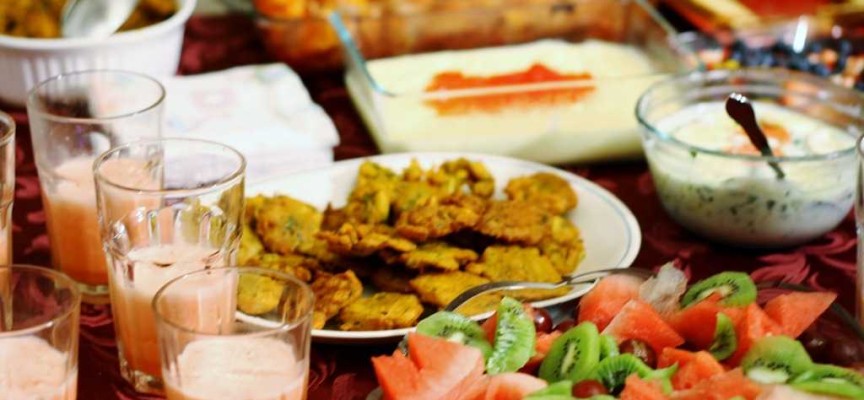“Ramadan is only a few days away and I haven’t even started preparations. What am I going to do?” Most of us have heard similar frantic self-talk before the beginning of Ramadan. Contrary to what one might assume, this anxiety is not about preparing the body and soul for Ramadan; it is about the Ramadan menu and all the iftari and sehri ideas and prep. Every year before Ramadan, I see and hear women in my family talking about what are they going to make for iftari and sehri.
Don’t get me wrong, I am not saying that people care only about what they are going to eat during Ramadan. They also worry about shopping for Eid and spend an obscene amount of time in malls and shopping centers. As soon as you turn the TV on (another nuisance, which consumes precious moments of this blessed month), all you see is fashionably dressed women and some men, trying to teach you to cook mouth-watering foods for Ramadan feasts. This type of pakoray, that type of chat, dozens of beverage concoctions and similar things is what you see on TV. What’s generally missing from the picture is a focus on the bounties and spiritual gains from Ramadan.
Humans are creatures of habit and it’s normally not possible to change yourself overnight. Yet, when Ramadan approaches, we feel that we can just turn on our piety switch at the sighting of the moon and go full throttle throughout the month. This is NOT how it works, in order to receive all the blessings of this month; we must start our preparations far in advance. One way to put things in perspective is to imagine that this may be our last Ramadan and we must try to get all of its rewards.
How to Prepare for Ramadan?
You probably have seen several lists of things to do to prepare for Ramadan. While there is a lot of good information and actionable items in those lists, I feel that we should first focus on just the core preparation items.
Reciting Qur’an: Ramadan is the month of Qur’an, which means that spending time with Qur’an is the most important aspect of Ramadan.
“The month of Ramadan is the one in which the Quran was sent down, a guidance for mankind, clear proofs for the guidance, the Criterion; so whoever amongst you witnesses this month, let him fast it.” (Al-Baqarah 2:185)
Therefore, we must spend as much time with Qur’an as possible during Ramadan. In order to develop a close relationship with Qur’an, we must start reciting and trying to understand it during the months prior to Ramadan. Once you start reciting it regularly and make it a part of your life, you will develop a connection with it, which will compel you to never miss a day without spending some time in its company.
‘Ayesha narrated that the Prophet (SAW) said: “Indeed the one who recites the Quran beautifully, smoothly, and precisely, will be in the company of the noble and obedient angels. As for the one who recites with difficulty, stammering or stumbling through its verses, then he will have twice that reward.” (Bukhari & Muslim)
“Whoever reads a letter from the Book of Allah, he will have a reward, and this reward will be multiplied by ten. I am not saying that ‘Alif, Laam, Meem’ (a combination of letters frequently mentioned in the Holy Quran) is a letter, rather I am saying that ‘Alif’ is a letter, ‘Laam’ is a letter and ‘Meem’ is a letter.” (Tirmidhi)
If you are not in a habit of reciting Qur’an, set manageable goals when starting, for example, maybe start with a couple of pages a day and then gradually increase the limit. Set a target of eventually reciting one para (chapter) per day so that you can at least finish Qur’an once during Ramadan.
Fasting before Ramadan: After starting to build a relationship with Qur’an, the next important preparation is getting your body ready for the sacrifices expected during Ramadan. It is kind of like starting a work-out routine; you don’t start pumping iron or running a mile from the first day. You have to gradually build endurance. Same goes for fasting, start keeping nafil fasts in the months prior to Ramadan. It is the sunnah of the Prophet (SAW) to fast on the 13th, 14th, and 15th of each lunar month. In addition to this, he also used to fast on Monday and Thursday.
“The deeds of people are presented to Allah on every Monday and Thursday. Allah forgives every Muslim except for those who are deserting each other.” He says: “leave them for later”. (Masnad Ahmad)
So, in order to prepare for Ramadan and to earn the most rewards of this blessed month, the two primary and the most crucial things are building a relationship with Qur’an and fasting in the months preceding Ramadan.
The Prophet (SAW) said: “Fasting and the Qur’an will intercede for the slave on the Day of Resurrection. Fasting will say: “O My Rab! I prevented him from food and desires, so accept my intercession for him.’ And the Qur’an will say: “I prevented him from sleep during the night, so accept my intercession for him.’ The Prophet (SAW) said: ‘And they will (be allowed to) intercede.’” (Ahmad, Tabarani Hakim)








Your article is an eye opener to negative ways of preparation for Ramadan